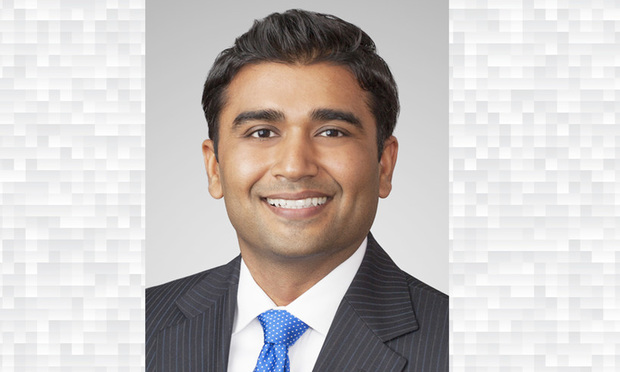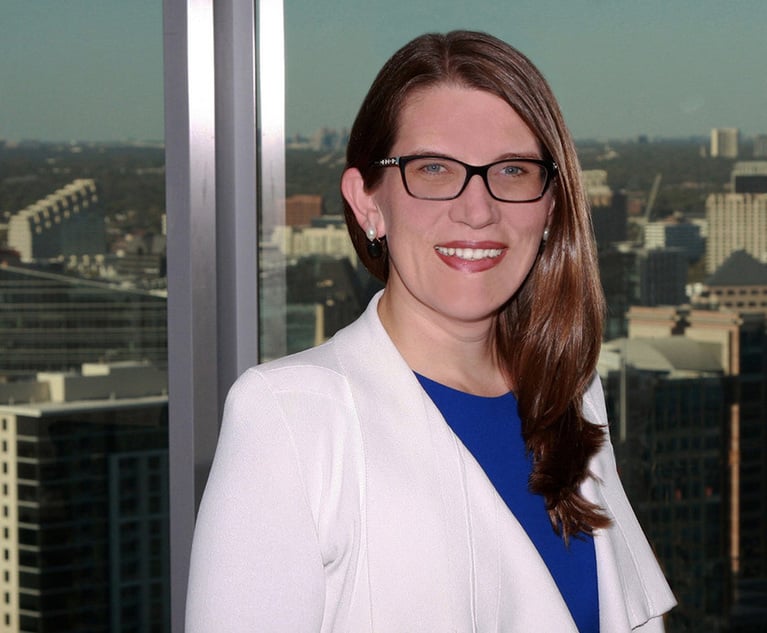Innovative Law Firm Targets Innovative Startups
Samar Shah is a former Big Law patent lawyer who saw an opportunity to go solo and help entrepreneurs in San Antonio's growing tech scene.
May 03, 2018 at 07:33 PM
7 minute read
 Samar Shah, founder of Shah IP Law in San Antonio.
Samar Shah, founder of Shah IP Law in San Antonio. Patent lawyer Samar Shah cut his legal teeth working for Big Law, first in Silicon Valley where he worked on the portfolios of some of the nation's most innovative companies, and then in San Antonio—the Texas city that aspires to be the next Silicon Valley. So it was a natural next step for the young attorney when he decided to go off on his own and found his own innovative law firm—one he treats more like the startups he aims to serve.
The 32-year-old Shah launched Shah IP Law last year—a firm that caters to San Antonio's growing technology scene. And he wants it to be very different from most large, full-service firms with IP practices. His overriding goal, he said, is to provide quality, low-cost patent prosecution work for startups.
“The model is not built to serve very large enterprise clients who have patent needs and huge budgets. They are better off going to a large firm that has the resources to throw at large patent portfolios,” he said.
Already, he has hired coders to develop software to help with administrative tasks at the firm. And recognizing that many startup clients are cash-starved, Shah plans to keep costs down by partnering IP lawyers at his firm with engineers and even “English majors” who would help draft patent applications.
“We'd have engineers who would figure out the technical side of the invention, writers who would figure out how to write it in a proper way, and have lawyers come in and review,” Shah said. “It's kind of like book publishing.”
Shah, who received a degree in biomedical engineering from Vanderbilt University and then went on to Santa Clara University School of Law, started his career in Silicon Valley. He wrote his first patent application for Palm's PalmPilot PDA while he was still a second-year law student and later worked on the Google and Facebook patent portfolios as an associate at Fenwick & West. After a stint as an associate at Paul Hastings, Shah moved to San Antonio in 2014, taking a job as counsel at Akin Gump Strauss Hauer & Feld, where he primarily did patent litigation.
He enjoyed the work and the people at Akin Gump, he said, but he grew frustrated because he frequently fielded calls from entrepreneurs who wanted help building a patent portfolio—work he had to turn down because those clients posed potential conflicts for Akin Gump.
In 2017, seeing a need in the market, he made his move. He decided to leave the prestige and trappings of a life at a successful firm like Akin Gump and launch his own firm—one that would focus on patent prosecution work for start-ups.
So far, he's glad he did.
“It's going really well,” Shah said, noting that he has done patent applications for all sorts of clients, including software developers, medical device companies, oil and gas companies, cyber-security companies, and companies that develop mechanical devices and machine learning.
Embracing Innovation and Finding a Niche
Shah clearly saw a need for his skills in San Antonio's burgeoning tech scene. The San Antonio-New Braunfels metro area is ranked sixth among 40 metropolitan areas for startup activity, according to the most recent Kauffman Index report, which tracks business startup activity. In comparison, the Austin-Round Rock-San Marcos metro area is ranked second on the list and Houston-Sugar Land-Baytown is ranked ninth.
Sergio Palacios, a visiting assistant professor of entrepreneurial studies at St. Mary's University in San Antonio, said a “ton” of people in the area are working at tech startups—many of them centered at collaborative spaces for developing companies, such as Geekdom, Launch SA, and Maestro Entrepreneur Center. The tech scene, Palacios said, “is booming in San Antonio.”
A confluence of factors has created momentum for startups in the area. A large amount of intellectual property has come out of several area universities, and a great deal of cyber-security work is being carried out at military installations in the area, according to Luis Martinez, director of the Center for Innovation and Entrepreneurship at Trinity University in San Antonio. In addition, the Brooke Army Medical Center at Fort Sam Houston has been a source of innovation in the tech scene.
And Shah brings experience to that scene, Martinez said.
“He has extensive experience with Silicon Valley companies and bringing it to San Antonio is very important, using IP not just to protect you, but as a strategic tool. Samar has found himself in a really special niche right now to catch that wave as it's coming,” he said.
Shah's firm is located at Geekdom—one of the collaborative spaces for startups, as is another small San Antonio firm, Innocenti Jones, which also works with developing companies and offers “startup in a box” packages on a subscription model tailored to each client's needs. Shah said the firms sometimes share clients.
But it may take awhile for Shah to implement all of the innovative ideas he has for his law firm. His legal work has kept him so busy, he hasn't had time to hire engineers and writers, although he plans to soon, he said. Meanwhile, he has used some contract IP lawyers to help him with the workload.
Shah is no stranger to legal tech, and he said he dedicated a lot of time over the last few months to software development. He hired coders to develop software for his firm to streamline client intake and document processing for patent applications. “Now, [with] the software, all forms are auto-generated for us. It allows me to run a leaner firm with less overhead,” he said.
He is also working on developing software to make it easier for clients to make more intelligent decisions about patents and whether they would be valued by venture capital firms that invest in startups. While large enterprises often obtain patents to defend their business, startups typically use patents initially to obtain funding.
And demonstrating yet again that he is focused on the needs of startup entrepreneurs, Shah said all of his billing is based on a flat fee. Does that mean the costs for his services are necessarily lower than at large firms, which typically bill IP work on an hourly basis? He doesn't know for sure. But what he can say is that his fees are predictable—a must for startups.
Shah is also well-versed in data analytics, which he uses to maximize his clients' odds of obtaining a patent, minimizing patent-pending time, and obtaining broad claim coverage. This impressed Alberto Pina, president of Braustin Mobile Homes, a company founded in 2017. Pina hired Shah to file a patent application for a mobile app that allows customers to purchase a factory-built home online or over the phone. He said Shah IP Law's pricing was fair because of the value Shah delivered.
“Filing a patent, especially if you've never filed one, is kind of intimidating,” Pina said. “What I liked the most about his approach was he was able to use data and numbers to really show the strength of the patent, show what potential barriers we might run into.”
This content has been archived. It is available through our partners, LexisNexis® and Bloomberg Law.
To view this content, please continue to their sites.
Not a Lexis Subscriber?
Subscribe Now
Not a Bloomberg Law Subscriber?
Subscribe Now
NOT FOR REPRINT
© 2025 ALM Global, LLC, All Rights Reserved. Request academic re-use from www.copyright.com. All other uses, submit a request to [email protected]. For more information visit Asset & Logo Licensing.
You Might Like
View All
US Patent Innovators Can Look to International Trade Commission Enforcement for Protection, IP Lawyers Say

Newsmakers: Capital Markets Partner Joins Hunton Andrews Kurth in Dallas

Film Company Alleges Elon Musk, Tesla Used AI to Mimic 'Blade Runner' Scene
6 minute readTrending Stories
- 1We the People?
- 2New York-Based Skadden Team Joins White & Case Group in Mexico City for Citigroup Demerger
- 3No Two Wildfires Alike: Lawyers Take Different Legal Strategies in California
- 4Poop-Themed Dog Toy OK as Parody, but Still Tarnished Jack Daniel’s Brand, Court Says
- 5Meet the New President of NY's Association of Trial Court Jurists
Who Got The Work
J. Brugh Lower of Gibbons has entered an appearance for industrial equipment supplier Devco Corporation in a pending trademark infringement lawsuit. The suit, accusing the defendant of selling knock-off Graco products, was filed Dec. 18 in New Jersey District Court by Rivkin Radler on behalf of Graco Inc. and Graco Minnesota. The case, assigned to U.S. District Judge Zahid N. Quraishi, is 3:24-cv-11294, Graco Inc. et al v. Devco Corporation.
Who Got The Work
Rebecca Maller-Stein and Kent A. Yalowitz of Arnold & Porter Kaye Scholer have entered their appearances for Hanaco Venture Capital and its executives, Lior Prosor and David Frankel, in a pending securities lawsuit. The action, filed on Dec. 24 in New York Southern District Court by Zell, Aron & Co. on behalf of Goldeneye Advisors, accuses the defendants of negligently and fraudulently managing the plaintiff's $1 million investment. The case, assigned to U.S. District Judge Vernon S. Broderick, is 1:24-cv-09918, Goldeneye Advisors, LLC v. Hanaco Venture Capital, Ltd. et al.
Who Got The Work
Attorneys from A&O Shearman has stepped in as defense counsel for Toronto-Dominion Bank and other defendants in a pending securities class action. The suit, filed Dec. 11 in New York Southern District Court by Bleichmar Fonti & Auld, accuses the defendants of concealing the bank's 'pervasive' deficiencies in regards to its compliance with the Bank Secrecy Act and the quality of its anti-money laundering controls. The case, assigned to U.S. District Judge Arun Subramanian, is 1:24-cv-09445, Gonzalez v. The Toronto-Dominion Bank et al.
Who Got The Work
Crown Castle International, a Pennsylvania company providing shared communications infrastructure, has turned to Luke D. Wolf of Gordon Rees Scully Mansukhani to fend off a pending breach-of-contract lawsuit. The court action, filed Nov. 25 in Michigan Eastern District Court by Hooper Hathaway PC on behalf of The Town Residences LLC, accuses Crown Castle of failing to transfer approximately $30,000 in utility payments from T-Mobile in breach of a roof-top lease and assignment agreement. The case, assigned to U.S. District Judge Susan K. Declercq, is 2:24-cv-13131, The Town Residences LLC v. T-Mobile US, Inc. et al.
Who Got The Work
Wilfred P. Coronato and Daniel M. Schwartz of McCarter & English have stepped in as defense counsel to Electrolux Home Products Inc. in a pending product liability lawsuit. The court action, filed Nov. 26 in New York Eastern District Court by Poulos Lopiccolo PC and Nagel Rice LLP on behalf of David Stern, alleges that the defendant's refrigerators’ drawers and shelving repeatedly break and fall apart within months after purchase. The case, assigned to U.S. District Judge Joan M. Azrack, is 2:24-cv-08204, Stern v. Electrolux Home Products, Inc.
Featured Firms
Law Offices of Gary Martin Hays & Associates, P.C.
(470) 294-1674
Law Offices of Mark E. Salomone
(857) 444-6468
Smith & Hassler
(713) 739-1250







